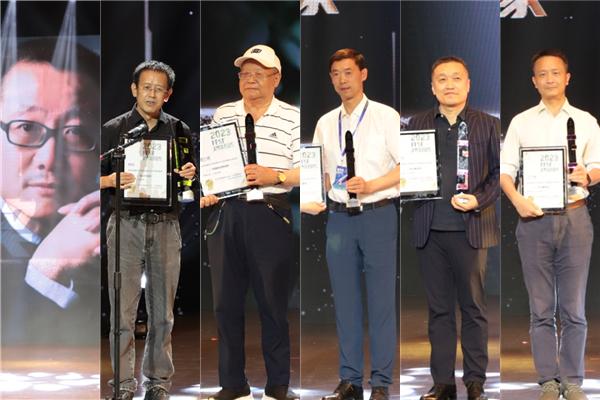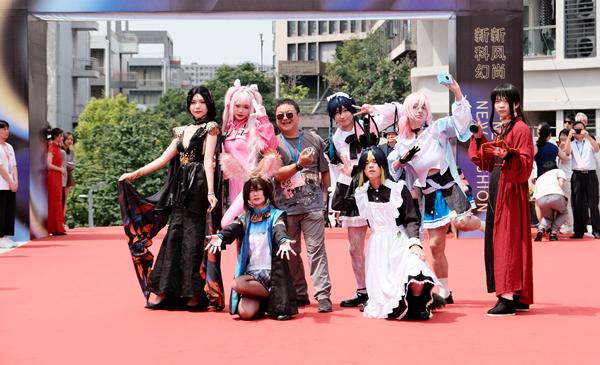China's 'sci-fi Nobel Prize' honors industry elites
- By Zhang Rui
 0 Comment(s)
0 Comment(s) Print
Print E-mail China.org.cn, June 15, 2023
E-mail China.org.cn, June 15, 2023
The inaugural Fishing Fortress Science Fiction Awards, ambitiously billed as China's "sci-fi Nobel Prize," split 1 million yuan in prize money across 35 award categories to honor China's sci-fi pioneers, legends, and masters such as Liu Cixin and Yao Haijun.

Winners and important participants of the inaugural Fishing Fortress Science Fiction Awards pose for a group photo on stage in Hechuan, Chongqing, June 10, 2023. [Photo/China.org.cn]
During the delicately orchestrated gala, full of sci-fi-esque lighting effects and dreamy performances, the awards were handed out one by one. The biggest awards were for the achievement section, where "The Three-Body Problem" writer Liu Cixin won the sci-fi master achievement award.
"As a science fiction fan and author in China, I consider myself fortunate to express myself through my works and introduce Chinese science fiction to the world," Liu stated in his acceptance speech via video link. "Science fiction is an enthralling genre that showcases human imagination and creativity. It provokes emotions and strikes a chord with humanity's collective vision for the future, the world, and the universe. Through science fiction, we come together as one and contemplate our existence while finding the courage to confront the future."
The Fishing Fortress Science Fiction Awards are sponsored by Chongqing College of Mobile Communication and organized by its Fishing Fortress Science Fiction College, founded in 2019, which is claimed to be the biggest sci-fi college in the world. This non-profit award recognizes exceptional works and individuals in sci-fi writing, translation, publishing, education, media, and art, as stated by the president of the sci-fi college, Zhang Fan. Categories also include best sci-fi novel, novella, short story, editor, book, art, teacher, publishing house, media, short film, stage play, and music single.
Another prominent sci-fi writer, Han Song, won the sci-fi academy award. In his speech, he reflected on his 41-year writing career and his experience as a witness to the rise of Chinese science fiction. He acknowledged the tireless efforts of those who have pushed forward with an unwavering spirit to make its revival possible. "In recent years, I have noticed two emerging trends – the rise of young authors and exceptional works produced by female writers," he added delightedly.
Dong Renwei, a revered and respected sci-fi and popular science writer, activist, and co-founder of the Chinese Nebula Awards, was awarded the China sci-fi promoter achievement award. "I'm excited to receive this award for myself, even though I have handed out countless awards to many people throughout decades. I am 81 years old, but I am also lucky to have an 18-year-old soul. I will try my best and do all I can to serve China's sci-fi community until the end," he said.

China's prominent sci-fi figures Liu Cixin, Han Song, Dong Renwei, Yao Haijun, Wu Yan, and Ding Zicheng receive their achievement awards on stage at the inaugural Fishing Fortress Science Fiction Awards gala in Hechuan, Chongqing, June 10, 2023. [Photo courtesy of Fishing Fortress Science Fiction College]
Wu Yan, a sci-fi scholar, writer, and professor at the Southern University of Science and Technology, received the sci-fi educator achievement award. "I joined the sci-fi circle in 1978 and opened a sci-fi course in university in 1991, which was very influential and attracted so many students; some even listened to my class standing outside the window. Now China's sci-fi education is developing so fast and reaching another level, and it means so much for our realistic development and future," he said.
The sci-fi publisher achievement award was given to Yao Haijun, the deputy editor-in-chief of Science Fiction World magazine and founder of many of China's sci-fi events. He is known for publishing heavyweight Chinese sci-fi works such as "The Three-Body Problem" and has discovered numerous writers. "I am a lucky man, as my career coincides with the brilliance of China's sci-fi megastars, including internationally influential writers such as Liu Cixin, Wang Jinkang, Han Song, and many emerging authors as well. I would like to take this opportunity to express my special gratitude to all of my authors because it is the radiance of your works that illuminates me. I also want to thank science fiction because it has allowed me to see the goodness and beauty of humanity in the twists and turns of life," he said after accepting the award.
Ding Zicheng, a sci-fi writer and translator of many Japanese sci-fi works under the pen-name Ding Dingchong, received the sci-fi translator achievement award. In his acceptance speech, he said that he believes that translation will always remain relevant for as long as there are diverse cultures, races, and even life on other planets. "What's important is the need for cultural exchange, as well as communication between people."

Sci-fi cosplayers pose with a guest on the red carpet before the inaugural Fishing Fortress Science Fiction Awards gala is held in Hechuan, Chongqing, June 10, 2023. [Photo courtesy of Fishing Fortress Science Fiction College]
Other notable winners across the other categories included Yan Xi, Gu Shi, Tianrui Shuofu, Bao Shu, Nozomi Omori, Science Fiction World magazine, and Chinese sci-fi brand Eight Light Minutes Culture. More than 200 expert voters from different fields participated in the Fishing Fortress Science Fiction Awards selection process. The awards aim to promote the collaborative development of sci-fi in various fields and encourage its integration into new areas such as education, communication, art, fashion, and new media while advocating for a diverse coexistence of sci-fi systems worldwide and promoting imaginative education and sci-fi as a future lifestyle and way of thinking.
Before the gala, a summit forum was held with speakers discussing various topics, including "A Guide to Cultivating Professional Sci-Fi Writers," "Sci-Fi Translators in the Era of Artificial Intelligence," "Sci-Fi Education Full of Possibilities," and "How to Unearth Chongqing's Local Sci-Fi Characteristics," while interacting with hundreds of attending writers and experts.






Go to Forum >>0 Comment(s)